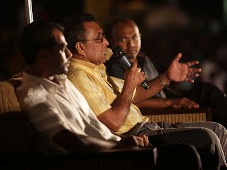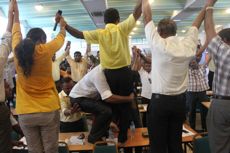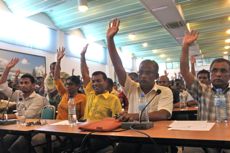Commonwealth Secretary General’s Special Envoy to the Maldives, Sir Don McKinnon, has arrived to Male’ yesterday to discuss the report released by the Commission of National Inquiry (CNI) following its investigation into the controversial transfer of power on February 7.
Presidents Office Spokesperson Abbas Adil Riza told local media outlet Sun Online that McKinnon was to visit Maldives before the release of the CNI report, but had to delay his visit because President Mohamed Waheed Hassan was not in town, and because of the holidays that followed.
Riza further stated that the government believed that this would be the farewell visit of McKinnon in his capacity as the Special Envoy.
He also added that the government would acknowledge the efforts made by the Commonwealth in helping resolve the political crisis that followed after the transfer of power, but added that the government “sees no role for the Commonwealth any more in the domestic issues of the country”.
Riza did not respond to calls at time of press.
Minivan News understands that Sir Don McKinnon is set to meet both President Waheed and his predecessor, former President Mohamed Nasheed.
McKinnon’s visit comes at a time where the current government of Maldives and the Commonwealth are at loggerheads over the issue of Maldives still being in the formal agenda of Commonwealth Ministerial Action Group (CMAG).
President Waheed has already sent letters to member states of CMAG demanding the immediate removal of Maldives from the CMAG’s agenda, claiming that the report by the CNI clears all doubts on legitimacy of the current government.
State Minister of Foreign Affairs and daughter of former President of 30 years Maumoon Abdul Gayoom, Dunya Maumoon, has already hinted about an impending withdrawal of Commonwealth membership if the Maldives is not removed from the formal agenda of the Commonwealth’s human rights and democracy arm.
Speaking at a press conference held in the Foreign Ministry on Wednesday, Dunya said, “We call on all the member countries of the CMAG to remove us from the agenda at the earliest possible opportunity. We do not altogether deserve to have been put on this agenda.”
Dunya stated that following the release of the report by the Commission of National Inquiry (CNI), many foreign countries had complimented the commission’s work. While she expressed concerns that “reactions from two countries are somewhat worrying”, she declined to name either country.
CNI Report
On August 30, CNI released its report into the circumstances surrounding the controversial resignation of former President Mohamed Nasheed and the transfer of power on February 7, stating that the transfer of power was legitimate and that it was neither a coup d’état nor a resignation under duress.
The CNI was initially a three member panel (Dr Ibrahim Yasir, Dr Ali Fawaz Shareef and Chairman Ismail Shafeeu), formed by President Waheed Hassan to examine the circumstances surrounding his own succession to presidency.
The Maldivian Democratic Party (MDP) of ex President Nasheed and the Commonwealth subsequently challenged the impartiality of the CNI, and it was reformed to include retired Singaporean judge G. P. Selvam and a representative of Nasheed’s, Ahmed ‘Gahaa’ Saeed.
Retired Court of Appeal judge from New Zealand, Sir Bruce Robertson, and Canadian UN Legal Advisor Professor John Packer, were appointed as international advisers representing the Commonwealth and UN respectively.
Nasheed’s representative Saeed resigned from the CNI on the evening of August 29, denouncing its credibility and alleging that the final report excluded testimony from key witnesses as well as crucial photo, audio and video evidence.
According to the published report, the change of government was “legal and constitutional”, and the events of February 6-7 “were, in large measure, reactions to the actions of President Nasheed.”
“The resignation of President Nasheed was voluntary and of his own free will. It was not caused by any illegal coercion or intimidation,” the report claimed.
In addition, “There were acts of police brutality on 6, 7 and 8 February 2012 that must be investigated and pursued further by the relevant authorities.”
The report dismissed the MDP’s allegations that the government’s ousting was a ‘coup d’état’, stating that the Constitution “was precisely followed as prescribed.”
“There appears nothing contestable in constitutional terms under the generic notion of a ‘coup d’état’ that is alleged to have occurred – quite to the contrary, in fact,” the report claimed.
“In terms of the democratic intent and legitimacy of the authority of the Presidency, as foreseen in the Constitution, President Waheed properly succeeded President Nasheed.”
“As President Nasheed clearly resigned and now challenges the voluntariness and legitimacy of his action, the onus is on him to establish illegal coercion or unlawful intimidation.”
Counter report by Sri Lankan legal experts
A legal analysis of the CNI report by a team of high-profile Sri Lankan legal professionals – including the country’s former Attorney General – prepared upon the request of the MDP stated that it was “selective”, “flawed” and had exceeded its mandate.
The legal analysis’ authors include two Sri Lankan Supreme Court attorneys – Anita Perera and Senany Dayaratne – and the former Sri Lankan Attorney General Shibly Aziz.
The analysis focused on five main areas: the CNI’s compliance with its mandate, the procedure pursued in exercising this mandate, the evidence gathering process, the adherence to the “imperative dictates” of natural justice, and the legal issues which ensue from this.
“The Report offends the fundamental tenets of natural justice, transparency and good governance, including the right to see adverse material, which undermines the salutary tenets of the Rule of Law.” Read the report
The report further suggested that there was “in fact adequate evidence to suggest that duress (or even ‘coercion’ and/ or illegal coercion as used by CNI) is attributable to the resignation of President Nasheed.”
“Even by the yardstick of ‘coercion’ or illegal coercion which the CNI has incorporated for reasons one cannot fathom- given the clear mandate- , ex facie the events accepted by the Commission and without anything more, does strongly and convincingly establish the ‘coercion’ or ‘illegal coercion’, the yardstick chosen by the Commission,” it read.




